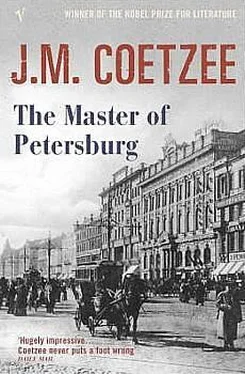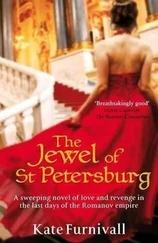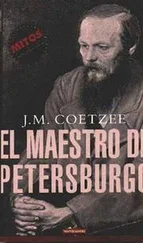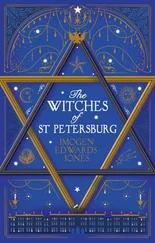He is distracted, and irritated with himself for being distracted. The very spirit of irritation keeps the scarecrow perversely alive; its mute indifference to his irritation doubles his irritation.
He paces around the room, changes the position of the table a second time. He bends towards the mirror, examines his face, examines the very pores of his skin. He cannot write, he cannot think.
He cannot think, therefore what? He has not forgotten the thief in the night. If he is to be saved, it will be by the thief in the night, for whom he must unwaveringly be on watch. Yet the thief will not come till the householder has forgotten him and fallen asleep. The householder may not watch and wake without cease, otherwise the parable will not be fulfilled. The householder must sleep; and if he must sleep, how can God condemn his sleeping? God must save him, God has no other way. Yet to trap God thus in a net of reason is a provocation and a blasphemy.
He is in the old labyrinth. It is the story of his gambling in another guise. He gambles because God does not speak. He gambles to make God speak. But to make God speak in the turn of a card is blasphemy. Only when God is silent does God speak. When God seems to speak God does not speak.
For hours he sits at the table. The pen does not move. Intermittently the stick-figure returns, the crumpled, old-man travesty of himself. He is blocked, he is in prison.
Therefore? Therefore what?
He closes his eyes, makes himself confront the figure, makes the image grow clearer. Across the face there is still a veil, which he seems powerless to remove. Only the figure itself can do that; and it will not do so before it is asked. To ask, he must know its name. What is the name? Is it Ivanov? Is this Ivanov come back, Ivanov the obscure, the forgotten? What was Ivanov's true name? Or is it Pavel? Who was the lodger who had this room before him? Who was P. A. I., owner of the suitcase? Did the P. stand for Pavel? Was Pavel Pavel's true name? If Pavel is called by a false name, will he ever come?
Once Pavel was the lost one. Now he himself is lost, so lost that he does not even know how to call for help.
If he let the pen fall, would the figure across the table take it up and write?
He thinks of what Anna Sergeyevna said: You are in mourning for yourself.
The tears that flow down his cheeks are of the utmost clarity, almost saltless to the taste. If there is a purging going on, what is being purged is strangely pure.
Ultimately it will not be given him to bring the dead boy back to life. Ultimately, if he wants to meet him, he will have to meet him in death.
There is the suitcase. There is the white suit. Somewhere the white suit still exists. Is there a way, starting at the feet, of building up the body within the suit till at last the face is revealed, even if it is the ox-face of Baal?
The head of the figure across the table is slightly too large, larger than a human head ought to be. In fact, in all its proportions there is something subtly wrong with the figure, something excessive.
He wonders whether he is not touched with a fever himself. A pity he cannot call in Matryona from next door to feel his brow.
From the figure he feels nothing, nothing at all. Or rather, he feels around it a field of indifference tremendous in its force, like a cloak of darkness. Is that why he cannot find the name – not because the name is hidden but because the figure is indifferent to all names, all words, anything that might be said about it?
The force is so strong that he feels it pressing out upon him, wave upon silent wave.
The third testing. His words to Anna Sergeyevna: I was sent to live a Russian life. Is this how Russia manifests itself – in this force, this darkness, this indifference to names?
Or is the name that is dark to him the name of the other boy, the one he repudiates: Nechaev? Is that what he must learn: that in God's eyes there is no difference between the two of them, Pavel Isaev and Sergei Nechaev, sparrows of equal weight? Is he going to have to give up his last faith in Pavel's innocence and acknowledge him in truth as Nechaev's comrade and follower, a restless young man who responded without reserve to all that Nechaev offered: not just the adventure of conspiracy but the soul-inflating ecstasies of death-dealing too? As Nechaev hates the fathers and makes implacable war on them, so must Pavel be allowed to follow him?
As he asks the question, as he allows Pavel his first taste of hatred and bloodlust, he feels something stir in himself too: the beginnings of a fury that answers Pavel, answers Nechaev, answers all of them. Fathers and sons: foes: foes to the death.
So he sits paralysed. Either Pavel remains within him, a child walled up in the crypt of his grief, weeping without cease, or he lets Pavel loose in all his rage against the rule of the fathers. Lets his own rage loose too, like a genie from a bottle, against the impiety and thankless-ness of the sons.
This is all he can see: a choice that is no choice. He cannot think, he cannot write, he cannot mourn except to and for himself. Until Pavel, the true Pavel, visits him unevoked and of his free will, he is a prisoner in his own breast. And there is no certainty that Pavel has not already come in the night, already spoken.
To Pavel it is given to speak once only. Nonetheless, he cannot accept that he will not be forgiven for having been deaf or asleep or stupid when the word was spoken. What he listens for, therefore, is Pavel's second word. He believes absolutely that he does not deserve a second word, that there will be no second word. But he believes absolutely that a second word will come.
He knows he is in peril of gambling on the second chance. As soon as he lays his stake on the second chance, he will have lost. He must do what he cannot do: resign himself to what will come, speech or silence.
He fears that Pavel has spoken. He believes that Pavel will speak. Both. Chalk and cheese.
This is the spirit in which he sits at Pavel's table, his eyes fixed on the phantasm opposite him whose attention is no less implacable than his own, whom it has been given to him to bring into being.
Not Nechaev – he knows that now. Greater than Nechaev. Not Pavel either. Perhaps Pavel as he might have been one day, grown wholly beyond boyhood to become the kind of cold-faced, handsome man whom no love can touch, even the adoration of a girl-child who will do anything for him.
It is a version that disturbs him. It is not the truth, or not yet the truth. But from this vision of Pavel grown beyond childhood and beyond love – grown not in a human manner but in the manner of an insect that changes shape entirely at each stage of its evolution – he feels a chill coming. Confronting it is like descending into the waters of the Nile and coming face to face with something huge and cold and grey that may once have been born of woman but with the passing of ages has retreated into stone, that does not belong in his world, that will baffle and overwhelm all his powers of conception.
Christ on Calvary overwhelms him too. But the figure before him is not that of Christ. In it he detects no love, only the cold and massive indifference of stone.
This presence, so grey and without feature – is this what he must father, give blood to, flesh, life? Or does he misunderstand, and has he misunderstood from the beginning? Is he required, rather, to put aside all that he himself is, all he has become, down to his very features, and become as a babe again? Is the thing before him the one that does the fathering, and must he give himself to being fathered by it?
If that is what must be, if that is the truth and the way to the resurrection, he will do it. He will put aside everything. Following this shade he will go naked as a babe into the jaws of hell.
Читать дальше












